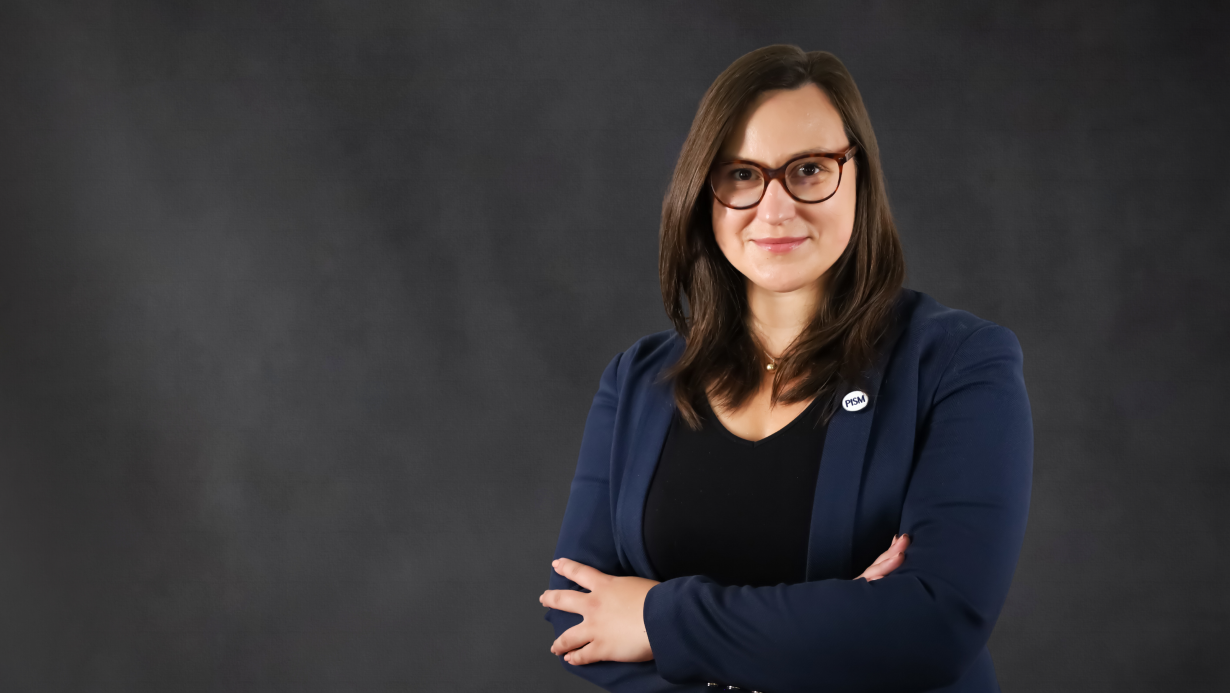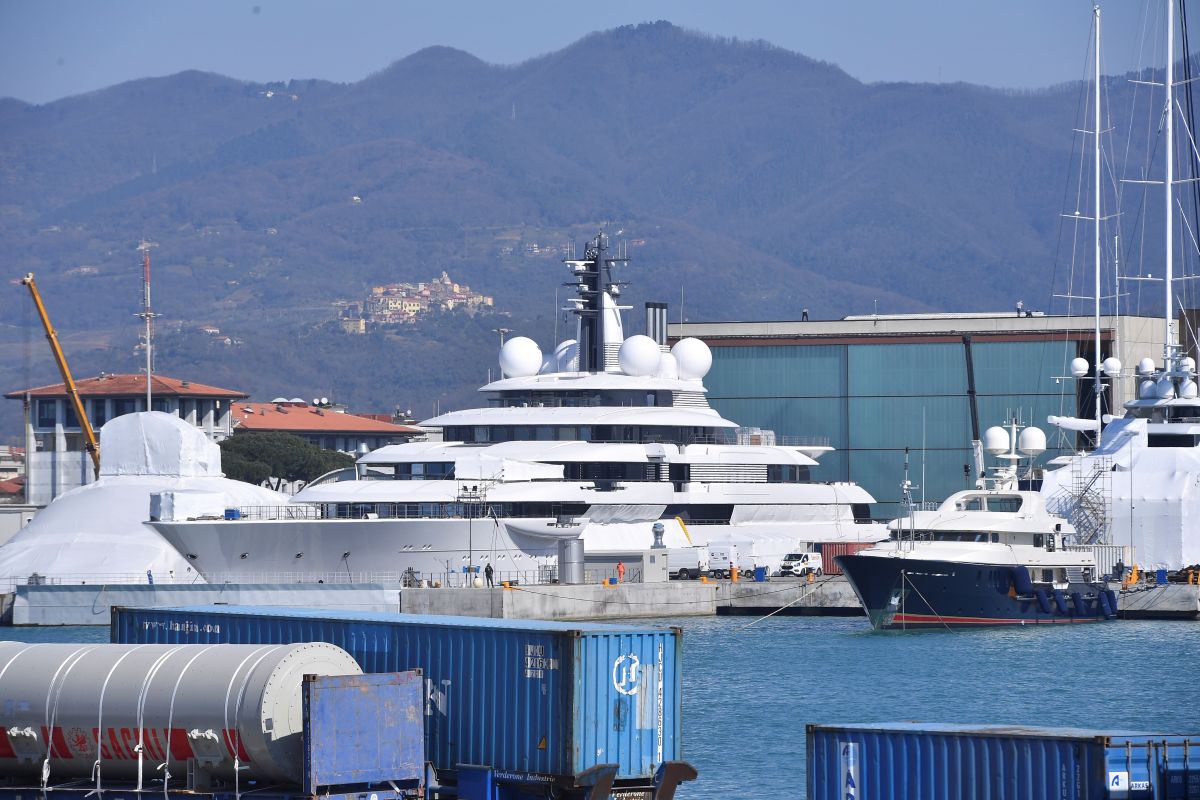Russian Elites Challenge EU Sanctions
Complaints submitted to the EU General Court by members of Russia’s political, military, and economic elite against the sanctions imposed on them by the EU in response to the armed attack against Ukraine have been successful in a few cases. Most of the complaints are still pending, but favourable verdicts were issued in specific cases of individuals who resigned their positions and some of their family members. In their cases, they often accuse the Union of citing outdated information or unreliable sources, so it is in the interest of EU states to continuously gather evidence to maintain the restrictions.
 Joanna Borowska / Forum
Joanna Borowska / Forum
Sanctions imposed by the EU over Russian aggression against Ukraine, with some renewed since 2014, now cover almost 1,700 individuals and 300 legal persons, mainly from Russia but also from other countries such as Belarus. The sanctions pertain to, among others, restrictions on entry to the EU and the freezing of assets in the Union. Those targeting Russia’s power elite include President Vladimir Putin, major politicians, the military, and other influential individuals, such as propagandists, oligarchs, and sometimes their family members.
Procedural Issues
The imposition of sanctions (generally for six months), renewal, or lifting of them by the EU is decided by the Council on the basis of information prepared by its working groups in coordination with the European External Action Service. These are mostly based on publicly available sources, including press, internet, and social media.
Removal of natural and legal persons from the sanctions list on the Council’s initiative is rare (e.g., the late Yevgeny Prigozhin), but those subject to sanctions can request a review of the justification for their retention. As the Council usually upholds its decisions, those concerned lodge complaints with the EU General Court. This does not result in the automatic suspension of the sanctions, so many of the complainants at the same time request—mostly without success—that the General Court order interim measures that would have this effect. Even in the case of a favourable decision by the General Court at the first instance, the complainant has to wait for the sanction to be lifted (until the time limit for an appeal to the CJEU expires) and, if an appeal is lodged, for the judgment to be delivered at the second instance.
The Council has wide margin of appreciation in imposing restrictions, so judicial review is limited to assessing the correctness of its findings of fact and reasoning, its procedures, and possible abuse of power. Those subject to sanctions are not protected by the presumption of innocence, so it is up to them to convince the Court of the need to remove from the list and, in the case of compensation, of the damage suffered and its amount.
Status of Cases
To date, the General Court has received about 100 actions for annulment of the Council’s decision to impose sanctions in connection with Russian aggression against Ukraine. Figures vary depending on how they are counted, for example cases initiated by the same person, consideration of sanctions extended since the annexation of Crimea, companies, or complaints withdrawn. Nevertheless, it is a large number compared to recent years, such as 2022 when the Court registered overall 103 cases for all EU sanctions, including those imposed in connection with conflicts in Africa, among others.
The applicants accuse the Council of misjudging facts, referring to outdated or low-quality information, or of exaggerating the role the target played (e.g., they present the financing of the regime as fulfilling tax obligations). The applicants consider the restrictions disproportionate and in violation of the prohibition of discrimination. Some even claim that the sanctions block them from implementing the green transformation in Russia or participating in the peace process in Ukraine, but the Court does not accept this argumentation.
Only a handful of complainants have been successful. The Court overturned the restrictions imposed on Dmitry Ovsyannikov, former mayor of Sevastopol and Minister of Industry and Trade of the Russian Federation, as he had ceased to hold these positions. Alexander Shulgin also won his case after resigning as head of Russia’s largest e-commerce platform, Ozon. Alexander Pumpyansky’s resignation from the leadership of the Sinara Group, which, among other things, provides financial support to the Russian government and companies (railways, Gazprom, Rosneft), had a similar effect. However, the Court denied him €100,000 in damages because the applicant did not prove that, as he claimed, the sanctions had jeopardised his reputation and damaged his family and social relations, nor did he explain how he had calculated the amount demanded. The disassociation from, or lack of business ties with, people in Putin’s circle led to the lifting of restrictions on Olga Ayziman, who was divorced from oligarch Mikhail Fridman, and Violetta Prigozhina, Yevgeny’s mother. The win, however, did not improve her situation, as she remained, like Shulgin, on the sanctions list on the basis of EU decisions not affected by the complaint. Among those who managed to win suspension of sanctions, on the other hand, the biggest success was achieved by oligarch Dmitry Mazepin’s son Nikita, an F1 driver. He was conditionally allowed, among other things, to take part in EU recruiting and racing due to the possible irreversible consequences of blocking a career he did not owe solely to his father. However, the Court did not agree to apply this solution automatically when extending the sanction, so he has to make further requests.
The Court has more often refused to suspend or lift sanctions. Since last September, it has dismissed a number of complaints by individuals considered to be influential, financially or materially supporting the regime, responsible for destabilising Ukraine, or belonging to Putin’s closest circle. This qualification for sanctions of Dmitry Pumpyanskiy (Alexander’s father), Tigran Khudaverdyan, Alexei Mordashov, and Dmitry Mazepin was supported, among others, by their participation in a meeting with Putin on 24 February 2022 on the impact of sanctions on the Russian Federation. The Court also ruled against other oligarchs, including Viktor Rashnikov, CEO of Magnitogorsk Iron & Steel Works; the main shareholder of Alfa Group (which owns the largest private bank of the Russian Federation), businessman and politician Roman Abramovich; and Pumpyansky’s wife Galina (she runs a foundation linked to her husband’s business). The Court was not persuaded by partial resignations, such as Khudaverdyan’s change of position from director to “consultant” of Yandex (the Russian equivalent of Google), in which he still holds shares. Of no significance was the resignation from the management of Novatek (a gas producer) by Gennady Timchenko, founder and owner of the Volga Group, which is a shareholder in key sectors of the Russian economy and indirectly in media. The Court also upheld the restrictions against his co-founder and wife Elena Timchenko. Their appeals and other complaints are pending.
Challenges
Complaint about sanctions confronts the EU with the need to balance human rights with its interests in protecting the integrity of the system. The challenge therefore is how to the keep information accurate, as complete as possible, and up to date, as well as adhering to reasonable lengths of the cases (on average, they last more than 16 months per instance, plus waiting time for the enforcement of the decision), which may expose the EU to accusations of protracted proceedings. For example, the complaints by Alfa Grup shareholders Mikhail Fridman, Peter Aven, or oligarch Alisher Usmanov have been pending since May and June 2022.
Acknowledging the claimants’ case often does not mean the end of their problems. Removal from the EU sanctions list does not block the application of restrictions by other jurisdictions (e.g., the US) and does not preclude the EU from applying them again. It occurs without compensation and the Court treats the judgment itself as a form of redress. Successful applicants also expose themselves to possible reprisals by the regime. For example, in response to the removal of some individuals from the list, Kremlin spokesman Dmitry Peskov stated that those who adopt anti-Russian rhetoric to avoid sanctions are traitors.
Conclusions and Outlook
The largest number of complaints against EU sanctions relate to restrictions imposed in connection with Russia’s aggression against Ukraine since 2014, but even so, the percentage of appeals remains relatively low. This may be because it assumes a high risk with a low and remote likelihood of delisting. The only way it can happen is if relatives of the oligarchs can demonstrate a complete renunciation of their support for the regime or the absence of business links to the oligarchs’ activities. EU sanctions have therefore not led to a decline in Putin’s support among the elite.
The General Court’s decisions confirm that the restrictions meet EU standards and that the appeals do not have the potential to unseal the sanctions regime. The few successes of the complainants have been related to the Council being unable to sufficiently justify the extension of restrictions. Poland can support the EU by continuing to collect information justifying sanctions’ application to individuals. It can also join pending cases on the side of the Council (Latvia and Belgium have already done so in some cases) and encourage other Member States to do likewise.



.png)

.jpg)